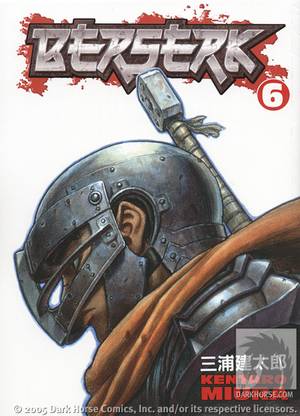
So over here is a summary, preview, and other details about Berserk 6.
What can you take away from it for your own campaign?
Introducing NPCs. Give the NPCs some quick quirks that the players will notice. For example, we're introduced to Princess Charlotte this volume and she takes to Griffith like a moth to flame.
We also see how many parts of the setting work in between noble and 'commoner'. Julius is the brother to the king and a general of his own army. But that army isn't doing it which is why Griffith is needed in the first place.
Many of the nobles in Midland have huge issues with a group of commoners being lead by a man with no noble blood moving up the ranks so quickly.
Some of them, like Minister Foss, can be more dangerous than the monsters and mercenaries faced in the field.
For example, while taking no part in it himself, Foss convinces Julius that the best way to take care of Griffith, is a hunting 'accident' during the king's hunt where Griffith's forces will be the escort for the nobles.
The hunt itself is another good example of making the campaign setting larger than merely the dungeon. What do the people do when they're not going on adventurers? In this case, the nobles enjoy hunting, they enjoy having horses, fine armor and fine weapons with the land in which to do so safely.
Continue the use of foreshadowing. If you've had a campaign running for a while and things are continuing to go in the same vein, keep up the good work. Here, Griffith is apparently assassinated with a well poisoned arrow but it's actually blocked by the egg of the king, introduced before this and a device that's saved his life before. It continues to showcase it's vitality.
In addition, Griffith's knowledge base continues to grow while Guts continues to train. This makes the former more apt and able in the new circles he travels, but it makes the latter far more dangerous on the field of battle.
Next, make sure to be prepared to allow the players to figure things out. Griffith's assassin initially makes away with no problem but there are numerous clues that point to the person responsible. If the players are smart enough to figure out things and move forward with those well laid out plans, allow them to succeed.
But some may be asking, what's with the title?
Towards the end of this volume, there is a massive battle where whole armies are put to the field. Guts and Caska, another commander, become seperated from the main group and the story then shifts focus and attention to them.
If your stories aren't in a dungeon and are more freeform, it can seem to be difficult to allow the players the focus of attention they deserve as they are the players, whle putting them in a larger context.
There are numerous ways to do this. In an army battle, the players handle the hot spots. In a city siege, the party becomes seperated from the main army through collapsed streets, fallen buildings, or other natural disaster.
By keeping the focus on the party as opposed to the world, you allow the party to influence what happens in the world as it effecs the party. Perhaps in a city siege the party is seperated from the main body of soldiers but in doing so, gets access to information that is vitally needed. Perhaps they are able to use old sewer systems to launch an assassination attack at the commander of the enemy forces. Perhaps in the forest the party discovers a group of stones that when activated, allows the party to cover vast distances quickly, allowing them to act as a vanguard for an army invasion.
The game requires the party to be the focus of the campaign in that the party, and what the party learns and how they react to it, define the world.





No comments:
Post a Comment